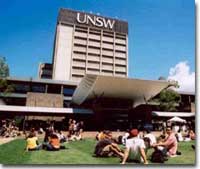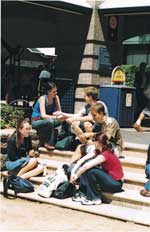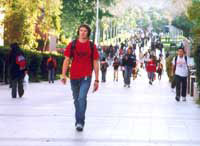|
||||||||||
| Faculty Centres and Units | ||||||||||
Australasian Legal Information Institute (AustLII)
Australian Human Rights Centre Centre for Interdisciplinary Studies of Law Continuing Legal Education Centre Cyberspace Law and Policy Centre Diplomacy Training Program Gilbert + Tobin Centre of Public Law Indigenous Law Centre Kingsford Legal Centre National Children's and Youth Law Centre National Pro Bono Resource Centre Social Justice Project Australasian Legal Information Institute (AustLII) The Australasian Legal Information Institute (www.austlii.edu.au) provides free internet access to Australian legal materials and to global legal materials through its WorldLII, AsianLII and CommonLII services.
AustLII is one of the largest sources of legal materials on the Internet. The AustLII collection contains over 270 full-text databases including the legislation of all Australian jurisdictions, decisions of all superior Courts and over 100 Courts and Tribunals in total, the complete Australian Treaties Library, the reports of almost all Law Reform Commissions, and over 30 law journals. AustLII has provided its software and expertise to assist in the creation of other free access legal information institutes in the South Pacific (www.paclii.org), United Kingdom and Ireland (www.bailii.org), Hong Kong (www.hklii.org) , South Africa (www.saflii.org), New Zealand (www.nzlii.org) and elsewhere. In cooperation with all these organisations, AustLII has created and runs WorldII, the World Legal Information Institute (www.worldlii.org), AsianLII (www.asianlii.org), covering 28 Asian countries and CommonLII (www.commonlii.org) covering all Commonwealth countries. WorldII provides access to over 650 free access databases from contributing LIIs, and has developed its own collection of decisions of international courts and tribunals. AustLII is by far the most-used Australian legal resource on the Internet, receiving up to 800,000 'hits' per working day. AustLII's users span the whole community, including educational institutions, the legal profession, business and government. AustLII is operated jointly by the Faculties of Law at UNSW and at the University of Technology, Sydney (UTS). It is funded by grants and donations of over $1.5 million per year from sources such as its host universities, the Australian Research Council, Asian Development Bank, AusAID, government agencies, Courts and Tribunals, law firms and legal publishers. For more information about AustLII, please contact feedback@austlii.edu.au Australian Human Rights Centre Established in 1986, the Australian Human Rights Centre is an inter-disciplinary research and teaching institute based in the Faculty of Law at the University of NSW.
The AHRC brings together student interns and volunteers, Australian and international research scholars, and academics and practitioners with a view to increase public awareness of human rights issues, laws, standards and processes within Australia and the international community. The Centre facilitates and undertakes research projects and educational programs on contemporary human rights issues, with a particular focus on economic, social and cultural rights. Its current areas of work include health and human rights; trade and corporate accountability; environmental justice and international humanitarian law. The AHRC coordinates and develops interdisciplinary courses on aspects of human rights, including the establishment of cross-faculty teaching linkages. It also provides a forum for debate and scholarship by hosting seminars, conferences and the Annual AHRC Public Lecture. The AHRC disseminates accessible information on developments in the human rights field through a variety of online resources, and the publication of the Australian Journal of Human Rights and the Human Rights Defender. For further information, contact the AHRC by telephone: (02) 9385-1803, email ahrc@unsw.edu.au, or visit the website: www.ahrcentre.org Centre for Interdisciplinary Studies of Law The Centre for Interdisciplinary Studies of Law is a new Centre based in the Law School, which seeks to explore law and law-related life, by drawing on insights and researchers from a variety of scholarly disciplines in the humanities and social sciences.
The institutions, practices, and consequences of law itself are of significance from many points of view other than those of insider-experts. They are of interest to, and can be illuminated by, a variety of disciplines. And when law hits life, experts on various aspects of life are as important as experts on law, but they often do not mix enough or well enough. The Centre for Interdisciplinary Studies of Law seeks to encourage such meetings, both literally, by bringing people together, and metaphorically by bringing ideas of varying provenance to bear on law, its character, effects, and interactions. The Centre does not pursue ‘interdisciplinarity’ as an end in itself. That way tends quickly to be undisciplined in all senses of the word. Rather, we are concerned to focus on problems that benefit from insights drawn from several disciplines. It is the match with those problems, not the particular provenance of the researcher that matters to us. However, there are many such problems which can be addressed more broadly and deeply through the cooperation of lawyers with scholars from disciplines other than doctrinal law. We focus on such problems. The Centre is based in the Law School, but maintains strong connections with other Schools and Faculties within the University, in other universities in Australia and internationally, and with other institutions whose activities intersect with the programs being carried out by Centre members. It has begun a number of programs of an interdisciplinary character, each headed by a scholar with expertise and interest in developing research activity in his/her particular field. At the moment the programs under way are: * Expertise, Evidence and Law (program director: Gary Edmond) For further information, please contact the Centre Directors: Adam Czarnota (9385 2255; a.czarnota@unsw.edu.au or Martin Krygier (9385 2240; m.krygier@unsw.edu.au Continuing Legal Education Centre The Continuing Legal Education Centre (CLE) provides high quality professional education and Continuing Professional Development (CPD) for lawyers and other professionals. CLE provides an important link between the Faculty of Law, the legal profession in Australia and the wider national and international community.
The objectives of the CLE program are:
The range of programs offered includes:
For further information on particular CLE/CPD activities please contact the Director, Christopher Lemercier, telephone (02) 9385 3227, fax 9385 1155, 9385 1778 website www.cle.unsw.edu.au
Cyberspace Law and Policy Centre
The Cyberspace Law and Policy Centre facilitates research, education and public interest advocacy on legal and policy issues concerning transactions in cyberspace and the worlds of IT and digital communications. The distinctive aim of the Centre is to assess these frequently technical issues from a public interest perspective. The centre made the transition in 2004 towards a research projects basis after generous initial startup sponsorship from major international law firm Baker & McKenzie from 2001.
Core centre activities include the support of research and publications by our research associates and postgraduate research associates, the organisation of conferences and symposia for the public and various professions or sectors, and promotion of awareness of public interest aspects of online, IT and IP issues. Topics covered include e-commerce and digital financial services, online content regulation, e-crime and e-security, international aspects of Internet regulation’, e-authentication, Spam regulation, impact of the US FTA on intellectual property laws, and effectiveness of privacy laws. These dealt with a range of emerging issues such as challenges to earlier copyright models brought on by advances in IT and networking, mechanisms for ensuring trust in online transactions, the extension of privacy rules to the private sector and the internet, new legislative initiatives on cyber-crime and Internet censorship, and the resolution of jurisdictional issues in relation to disputes arising out of cross-national online transactions. The symposia provide a forum for free–ranging discussion between experts about the issues involved; by avoiding the conference format and allow experts a unique opportunity to exchange views. The Centre also works with AustLII to develop new research resources, online publications and experimental meta-search tools, and invites interns and other visitors to take part in our activities. The Centre is auspicing a number of major ARC research projects, hosting visiting scholars and research databases in other areas, and developing proposals for further research. The projects include: 'Unlocking IP' exploring new models for sharing and trading intellectual property (Prof Graham Greenleaf and 10 other investigators and five industry partners), Interpreting Privacy Principles comparing how privacy principles in different jurisdictions are interpreted and applied (Prof Greenleaf and two international collaborators), and Regulating Online Investing doing fundamental user-centred research on the effectiveness of current contractual and regulatory arrangements for users of online investment services (Prof Dimity Kingsford Smith, with Prof Bottomley in ANU and Prof Williamson at Monash). A recent highlight was the international conference held in July 2006, "Unlocking IP 2006: The tasks ahead", which built on the original conference in 2004. For more information, see the Centre's website at: www.CyberLawCentre.org, or project sites cyberlawcentre.org/unlocking-ip, cyberlawcentre.org/ipp, and cyberlawcentre.org/onlineinvesting. The Diplomacy Training Program (DTP) is a non-government organisation, having an affiliation with the University through the Faculty of Law. It is physically located within the Faculty and enjoys the close involvement of academic staff in a voluntary capacity, both as trainers and Board Members. The DTP was founded in 1989 by Professor Jose Ramos Horta, 1996 Nobel Peace Laureate, representative in exile of East Timor at the UN for more than twelve years, and now President of Timor-Leste.
The Program provides training in human rights and "people's diplomacy" to non-governmental organisations and other sectors of civil society throughout the Asia-Pacific and indigenous Australia. In its nineteen years of existence, the DTP has developed specialised teaching materials and participatory skill-building methods based upon NGO needs and priorities. It provides an introduction to international human rights standards and procedures, including relevant UN conventions and institutions, and practical skills for human rights education and advocacy. Sessions include lobbying and negotiation, working with the media, using the internet, NGO strategies and institutional standards. New thematic programs have been developed on Indigenous Peoples Rights, Migrant Workers' Rights, Human Rights and Trade and Human Rights and Business. Since January 1990, the DTP has conducted seventeen annual regional training sessions of 3-4 weeks in Bangkok, Colombo, Dili, Manila, Sydney and Darwin, as well as regional and in-country sessions of 1-2 weeks duration in Australia, Bangladesh, Cambodia, Fiji, India, Indonesia, Malaysia, Melanesia, Nepal, New Zealand, the Philippines, Sri Lanka, Taiwan, Thailand and Wellington. To date, the DTP has trained over 1000 human rights defenders from 30 countries. Its board members are Professor Paul Redmond (Chair), Emeritus Professor Garth Nettheim (UNSW), Dr Sarah Pritchard (Barrister at Law), Ms Louise Sylvan (Commissioner, Australian Government Productivity Commission), Dr. John Pace (Former Secretary, UN Commission on Human Rights), Associate Professor Andrea Durbach (Director, Australian Human Rights Centre), Mr. Philip Chung (Executive Director, AUSTLII), Mr. Roewen Wishart (Australian Bush Heritage Fund), and Professor Andrew Byrnes (UNSW). Professor Jose Ramos-Horta continues his involvement as official Patron of the DTP. The DTP is independently funded from outside sources. Funders include: Oxfam; The Norwegian Ministry of Foreign Affairs; NZ AID; Caritas and the Myer Foundation. The DTP has close working relations with other NGOs, including Asian Human Rights Commission, (Hong Kong), Asian Forum for Human Rights and Development (Forum Asia), Asian Regional Resource Centre for Human Rights Education (Bangkok), Pacific Concerns Resource Centre (Fiji), Pacific Island Association of NGOs (Vanuatu); South Asia Human Rights Documentation Centre (India), Peace and Democracy Foundation, (Timor Leste), and the International Service for Human Rights (Geneva).
Gilbert + Tobin Centre of Public Law The Gilbert + Tobin Centre of Public Law provides a focal point for research into and discussion of important questions of public law for the academic, professional and wider community. The Centre promotes independent ideas and ground breaking research. The Centre is supported by the considerable weight of research and teaching expertise in the area of public law held by the academic staff of the Faculty.
The Centre has a high profile and an influential role in public debate in the broad domain of public law, a site of considerable legal, political and social significance. The work of the Centre is concentrated on specific long and short-term projects. Its projects cover topics such as Charter of Rights; Reform of Australian Federalism; Indigenous Rights, Land & Governance; Treaty between Indigenous and Non-Indigenous Australians, Climate Change ‘Refugees’ and International Law; Terrorism and Law; and the High Court of Australia. In addition the Centre comments regularly on other areas of public law as they arise in community discussion and debate. For more information, see the Centre's website at www.gtcentre.unsw.edu.au The Indigenous Law Centre was established in 1981 to develop and coordinate research, teaching and information services in the multi-disciplinary area of Indigenous peoples and the law. Our objectives are to:
To conduct legal research into Indigenous peoples and the law, emphasising the core ILC areas of research and publish and disseminate ILC research throughout Australia and internationally; To participate in national and international law and policy discussion and debate about Indigenous peoples and the law; To develop curricula and teaching materials on domestic and international Indigenous legal issues and encourage and foster student research in domestic and international Indigenous legal issues. The Centre has published the Indigenous Law Bulletin (previously the Aboriginal Law Bulletin) continuously since 1981 and currently produces six issues per year. The Australian Indigenous Law Review, a quarterly journal, is also published by the Centre. Staff and associates of the Centre teach both undergraduate and postgraduate electives in the Faculty of Law. Staff and associates are regularly called upon to give occasional presentations in other faculties and outside the University. The Centre welcomes visiting scholars, interns and volunteers. For more information, visit the ILC website www.ilc.unsw.edu.au or call the Centre on (02) 9385 2252 or email us at ilc@unsw.edu.au Kingsford Legal Centre is a community legal centre and the Faculty of Law's legal clinic. The Centre provides a clinical teaching program for law students where students are able to analyse the operation of the legal system and lawyer client relationships while working on cases for real clients.
The Centre is one of over 35 community legal centres in NSW, and students work under the supervision of Centre lawyers in acting for members of the local community who cannot afford private legal assistance. The Centre provides legal advice in a wide variety of matters and takes on cases in areas such as discrimination, employment, domestic violence, tenancy, credit and debt, consumer complaints, criminal law and victims compensation. The Centre assists over 3,000 people a year. The Centre began operation in 1981. It employs five lawyers, one of whom (the Director) is a Senior Lecturer in the Faculty of Law. The Centre is jointly funded by the Faculty of Law and the Community Legal Services Legal Funding Program through the State and Federal Governments. In addition, the law firm Freehills maintains the permanent secondment of a solicitor's position to the Centre. Beginning in Semester 2 2006, Allens Arthur Robinson provide a seconded solicitor for 6 months of each year also. The courses LAWS2303 Clinical Legal Experience (Intensive), LAWS2304 Clinical Legal Experience, and LAWS2305 Clinical Program-Employment Law, are electives for later year students. Students can take a course in either session. All courses are available over summer. Students take instructions from clients, prepare necessary documents, undertake legal research and are assist in the preparation of any court hearings. In this way, students can consolidate their study of the law by practical application. Small group classes, daily tutorials and constant consultation with the clinical supervisors who are practising lawyers provide an opportunity for students to analyse both their role as lawyers and the role of law in society. Over 60 volunteer solicitors and barristers participate in public advice sessions in the evenings and provide a legal mentoring scheme for students at the Centre. All students enrolled in the course LAWS6210 Law Lawyers and Society participate in an advice session at the Centre working with volunteer lawyers who provide advice to clients. The Centre is an internationally recognised Centre of excellence in clinical teaching and produces biannual Guides To Australian Clinical Legal Education. In its community legal centre function the Centre has been prominent in several areas, particularly anti-discrimination, legal aid and domestic violence. Students are also involved in reform campaigns, policy work and education services to the local community. For further information contact the Centre: Faculty of Law Building, Lower Campus Ground Floor, University of NSW, UNSW Sydney NSW 2052 Australia, telephone (02) 9385 9566, fax (02) 9385 9583, TTY (02) 9385 9572, email legal@unsw.edu.au.
National Children's and Youth Law Centre The National Children's and Youth Law Centre is a community legal centre which aims to promote the rights and interests of children and young people throughout Australia. The Centre commenced in 1993 as a joint project of the University of New South Wales, the University of Sydney, and the Public Interest Advocacy Centre. The Centre occupies premises provided by UNSW in the new Law School, lower campus, UNSW.
The Centre has a website (www.lawstuff.org.au) which provides legal information to young people on a broad number of issues in an accessible, colourful and approachable format, in addition to an email facility (LawMail) where young people may email the Centre for advice, information or referral from solicitors. For further information contact the Centre: Telephone (02) 9385 9588 fax (02) 9385 9589 or email ncylc@unsw.edu.au, website www.ncylc.org.au National Pro Bono Resource Centre The National Pro Bono Resource Centre (NPBRC) was established in August 2002 as an initiative of the Commonwealth Attorney-General. As advocate, broker, coordinator, researcher, and resource provider, the Centre plays the unique role of national leader and coordinator for pro bono legal services in Australia. Funded by the Commonwealth and State and Territory Attorney-Generals' Departments, the NPBRC aims to meet its objectives by:
The Centre coordinates the Public Interest Internship Program for the UNSW Law Faculty as part of its role in promoting the pro bono ethos amongst law students.
For further information contact the Centre: telephone (02) 9385 7381 or email info@nationalprobono.org.au The Social Justice Project (SJP) was established by its Director, Prof Julian Disney, in 2000. SJP undertakes and coordinates research, writing and advocacy on a range of issues affecting social justice in Australia and overseas. It also coordinates the Social Justice Internship Program for students in the Law Faculty. SJP works with paid and honorary consultants and activities are often undertaken in cooperation with non-governmental organisations at state, national and international levels.
The principal areas of work undertaken through or in association with SJP in recent years have included social justice aspects of - housing and urban development; - poverty reduction; - tax reform; and - global governance. Within these specialist areas, SJP activities include undertaking research, writing articles, publishing papers and books, organising seminars and workshops, making written and oral submissions, and chairing delegations and conferences. The Project has played a central role in the establishment and development of Anti-Poverty Week, the National Affordable Housing Summit and the Community Tax Project. It is the base for the Neighbours Program which promotes engagement between leaders of community organisations in Australia, Indonesia and other neighbouring countries. For further information, please contact sjp@unsw.edu.au or 02-9385-2850. Home | A Message from the Dean
School of Law - Faculty Centres and Units | Faculty Information and Assistance | Summary of Programs Australian School of Taxation - Faculty Information and Assistance | Summary of Programs |
||||||||||






